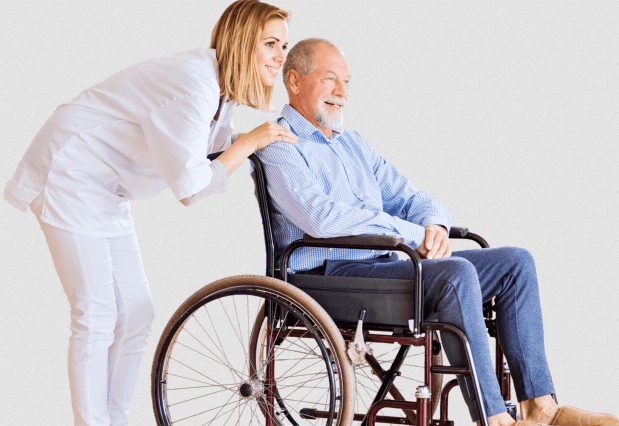
How To Coordinate Hospice Care At Home With Other Medical Services
Having a loved one enter into hospice care at home is never an easy thing for family members but the good news is that it’s much more comfortable for your loved one to receive hospice care at home instead of at an assisted living facility or a nursing home. End-of-life care is best given by family caregivers with the help of of hospice team and a hospice program that can handle pain and symptom management along with palliative care and medical equipment. When your loved one or family member is getting medical supplies, hospice aide, spiritual care, and emotional support with home hospice care, their quality of life and comfort will be much higher than with an end-of-life hospital stay.
No matter what the life expectancy of your loved one happens to be, you can expect them to get personal care and spiritual support, along with the medical treatment they need, even if it’s given for only a short time. Trained volunteers and a hospice doctor will make home visits and care for serious illnesses while providing symptom relief and meal preparation in the patient’s home, where they’re the most comfortable. Other medical care can be provided in conjunction with hospice care at home if your loved one is suffering from a terminal illness, such as chronic obstructive pulmonary disease, or any other serious illness.
What is Hospice Care?
Hospice care at home is the same as any other hospice care, whether it’s provided in nursing homes or a hospital bed and it’s easy to understand what it entails and what you can expect your hospice provider to do for your loved one. As the life of your loved one takes its natural course and all medical attempts have been exhausted to prolong his or her life, hospice, and palliative care are there to tend to their medical needs and make them as comfortable as possible while providing pain management they need at their end of life. Family members are also able to receive hospice care services and the hospice team will answer questions about their loved one as they arise.
Most Medicaid insurance plans will pay for at-home hospice care and a social worker will be assigned to you to make sure you’re getting the insurance benefits and insurance coverage you’re entitled to, whether it’s from Medicaid services or private insurance. They’ll ensure your private insurance, or veterans affairs, pays for hospice benefits so you don’t have to worry about it. Hospice providers will be there for all family members to provide health care for hospice patients and make private insurance pay your hospice benefit.
The Hospice Care Team
In-home hospice care will give you and your loved one the same health care you’d get at a hospice and palliative care facility so you never have to think hospice care at home is a lower level of hospice services. You’ll have access to a hospice doctor, palliative care, Nursing and medical care, medical supplies, a social worker, spiritual care, supplemental meal preparation, and grief counseling for you and other family members. There are also trained volunteers to provide home visits and personal care to ensure a high quality of life for your loved one.
A hospice aide will always be available to you because in-home hospice care focuses on keeping your loved one out of a nursing home and in his or her home where they belong. Ask what your health care provider thinks about your loved one’s end-of-life care and they’ll always tell you that the best quality of life can be found at home and not in an emergency room. Your worker will also make sure your Medicare hospice benefit covers all the costs of your hospice care services and palliative care.
Hospice Services

Hospice services are different than both palliative care and respite care but can be provided to someone with a terminal illness or serious illness at the end of their life when curative treatment is no longer an option. Home hospice care will provide the same pain management as a palliative care organization but also hospice benefits your loved one needs. These services go beyond their medical care and the hospice team will be the primary caregiver, along with family caregivers.
Hospice services include spiritual care, comfort, social services, and homemaker services along with the palliative care your loved one needs to be comfortable at home. Pain and other symptoms will be treated and grief counseling will be available to family members as your loved one reaches their end of life. The National Hospice and Palliative Care Organization provides resources and regulations to ensure your hospice team is always providing the highest level of home hospice care possible.
Benefits of Hospice Care at Home
The benefits of home hospice care are innumerable when your family member needs the highest levels of comfort and medical care at the end of their life and nursing homes will never be able to give them the feeling of being at home and surrounded by other family members. Your loved one’s primary caregiver will be able to explain how palliative care will take care of any serious illness from which they’re suffering. Hospice care will come from a hospice team that visits your loved one at home to provide medical care and spiritual guidance and emotional support is always available to the entire family.
No matter what the life expectancy happens to be, it’s always better to be at home than in an assisted living facility, surrounded by other people and spiritual support will make a bigger difference when it comes from family caregivers and in-home hospice care. If you’ve ever been in respite care, you probably know how much you wanted to get home and that’s what in-home hospice care can make happen for your loved one. Hospice care at home should always be considered when deciding on the end-of-life care your loved one will receive.
Getting Started with Hospice Care
Your loved one’s primary caregiver will be able to suggest a hospice care team to care for them but the decision will always be yours to make and it’s best to go with a provider who can give the care your loved one deserves. Find hospice care that’s part of the National Hospice and Palliative Care Organization to make sure they’re held to the highest standards and have the resources they need to care for their loved ones. Hospice patients rely heavily on their caregivers, so they deserve the best at their end of life.
The right hospice care at-home provider will have plenty of references from other families so you can find out how their experiences were and how well they cared for their loved ones. They should also offer pain alleviation and have the supplies necessary to care for a serious illness and manage other symptoms to keep your loved one comfortable. A phone call or an email is all it takes to refer your loved one to the right hospice care at-home provider.
Combining Hospice Care with Other Services
Getting hospice care at home will make it easy to combine it with other services to make sure all needs are being met at the same time and nothing is falling by the wayside. Hospice services can take on care needs they’re trained to provide to make it as easy and comfortable for your loved one as possible. Any needs that can’t be provided by the hospice team can easily be given by other professionals at home.
The primary caregiver will add any additional services to the hospice care and there will always be a time when the hospice team can step aside and let other providers in to care for your loved one. Hospice care always puts the patient first and all care will be administered at home. It’s the best way to ensure all needed care is there so your loved one never has to deal with a hospital stay and their quality of life remains as high as it can be.
Is Hospice Care Right for You?

If your loved one is reaching his or her end of life and needs help managing symptoms at home then hospice care is always going to be the best option, no matter what symptoms or serious illness they happen to be suffering from at the same time. When it’s time for them to transition to the next phase, an experienced hospice team should always be there to give them the quality of life they deserve in their own homes and not at a facility. Hospice care should always be considered because professional care will give them a level of comfort that family care simply can’t achieve on its own.
The decision will always be yours to make, but when finally care is needed by a loved one, it will be a comforting thought to know that caring professionals are there to help them and keep them happy while they provide symptom relief and personal care at home. Hospice benefits everyone from the patient to the family and loved ones and it’s something you’ll always be glad you chose to pursue when you look back at the way they met the end of their life. Get them the best care possible and you’ll know they got the comfort and support they needed, when they needed it the very most.
